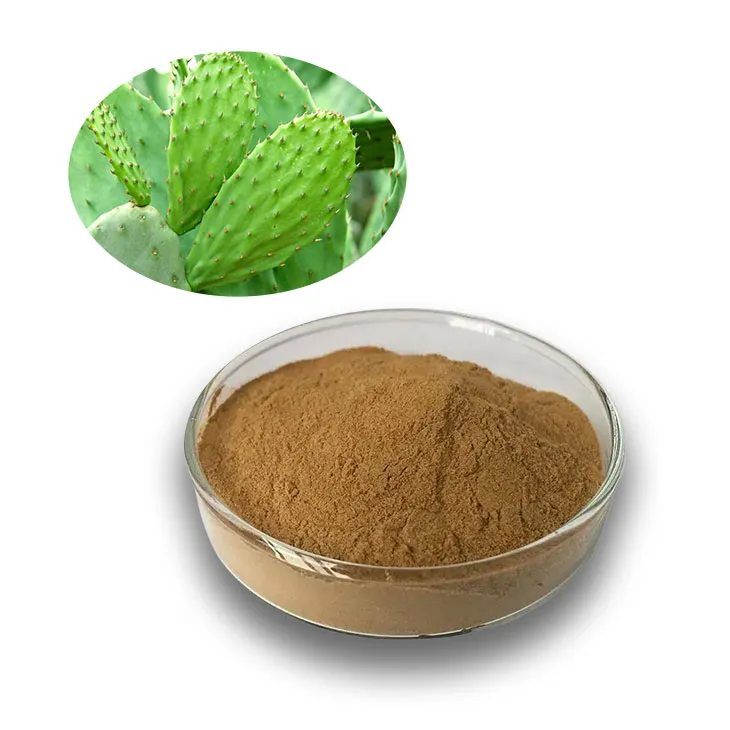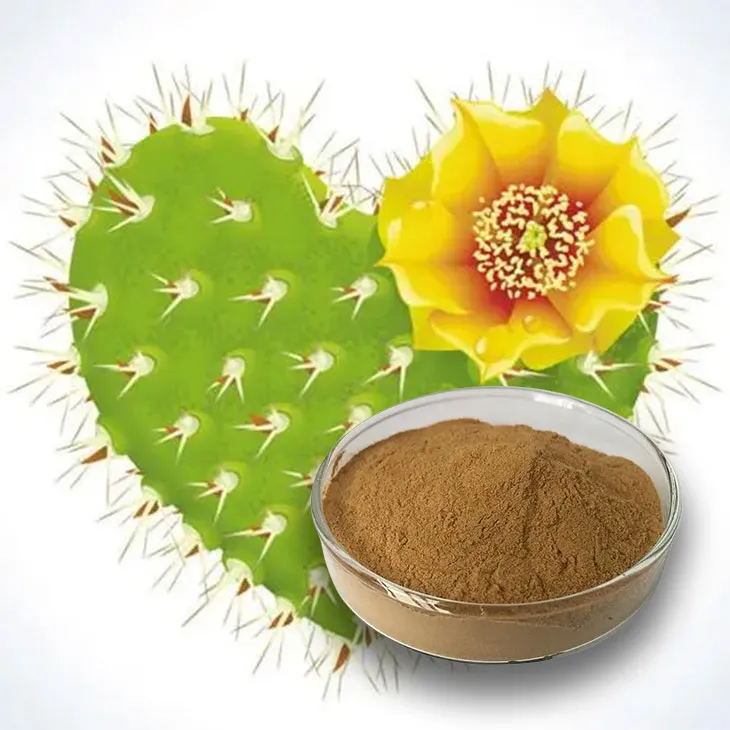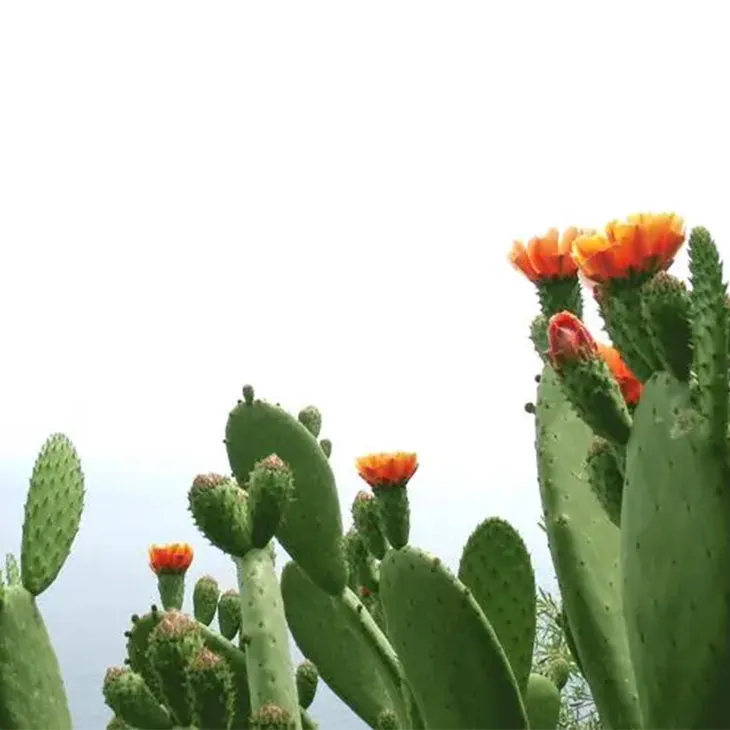- 0086-571-85302990
- sales@greenskybio.com
Benefits of Cactus Extract in Cattle Feed.
2024-11-13

1. Introduction
In the field of modern livestock farming, the search for innovative and effective feed ingredients is an ongoing process. Cactus Extract has emerged as a potentially valuable addition to cattle feed. Cacti are known for their ability to survive in harsh environments, and their extracts may offer unique nutritional and physiological benefits to cattle.

2. Nutritional Benefits
2.1. Rich in Essential Elements
Cactus Extract can supply a variety of essential elements that might be scarce in traditional cattle feeds. For example, it often contains certain minerals such as calcium, magnesium, and potassium. These minerals play crucial roles in maintaining the normal physiological functions of cattle. Calcium is essential for bone development and muscle function. In growing calves, an adequate supply of calcium from Cactus Extract can ensure proper skeletal growth. Magnesium is involved in enzyme activation and nerve function regulation. Cattle with sufficient magnesium intake are less likely to experience muscle tremors or nervous system disorders. Potassium helps in maintaining fluid balance and proper heart function within the body of the cattle.2.2. Source of Vitamins
Additionally, cactus extract can be a source of vitamins. Some species of cacti contain vitamins like vitamin C and certain B - vitamins. Vitamin C is an antioxidant that can help protect cells from damage. In cattle, it may contribute to a stronger immune system, enabling the animals to better resist diseases. B - vitamins, such as thiamine, riboflavin, and niacin, are involved in energy metabolism. When cattle consume cactus extract rich in B - vitamins, they can more efficiently convert feed into energy, which is beneficial for growth and milk production.
3. Digestive Benefits
3.1. Modifying Gut Microbiota
One of the significant advantages of cactus extract in cattle feed is its ability to modify the gut microbiota of cows. The gut microbiota of cattle is a complex community of microorganisms that plays a vital role in digestion. Cactus extract contains certain compounds, such as dietary fibers and bioactive substances, which can selectively promote the growth of beneficial bacteria in the gut. For instance, some types of fiber in cactus extract can act as prebiotics, providing a food source for probiotic bacteria like Lactobacillus and Bifidobacterium. The growth of these beneficial bacteria can lead to a more balanced gut microbiota. A balanced gut microbiota has several positive effects. It can enhance the breakdown and fermentation of feed in the rumen, the first and largest compartment of the cow's stomach. This improved fermentation process results in better extraction of nutrients from the feed. Moreover, beneficial gut bacteria can produce short - chain fatty acids (SCFAs) as by - products of fermentation. SCFAs, such as acetate, propionate, and butyrate, are an important energy source for the cattle. They can also help in maintaining the integrity of the gut lining, preventing the entry of harmful pathogens into the bloodstream.3.2. Improving Nutrient Absorption
By modifying the gut microbiota, cactus extract also contributes to better nutrient absorption in cattle. When the gut microbiota is in a healthy and balanced state, it can improve the absorption of nutrients such as proteins, carbohydrates, and fats. For example, certain bacteria in the gut can break down complex proteins into smaller peptides and amino acids, which are more easily absorbed by the intestinal cells. Similarly, they can help in the digestion of complex carbohydrates, converting them into simple sugars that can be absorbed and utilized for energy production. In terms of fats, the gut microbiota can play a role in emulsifying fats and facilitating their absorption. Overall, the improved nutrient absorption due to cactus extract can lead to better growth performance and higher milk production in cattle.
4. Antioxidant Benefits
4.1. Combating Oxidative Stress
Cactus extract has antioxidant properties, which is highly beneficial for cattle. Oxidative stress occurs when there is an imbalance between the production of reactive oxygen species (ROS) and the body's antioxidant defense mechanisms. In cattle, oxidative stress can be caused by various factors such as environmental stressors (e.g., high temperature, poor air quality), dietary factors, and infections. ROS can damage cells, proteins, and DNA, leading to reduced animal performance and increased susceptibility to diseases. The antioxidant compounds present in cactus extract, such as flavonoids and phenolic acids, can scavenge ROS and prevent oxidative damage. Flavonoids, for example, can neutralize free radicals by donating electrons without becoming reactive themselves. This helps in maintaining the integrity of cell membranes, protecting vital organs such as the liver and heart from oxidative damage.4.2. Enhancing Well - being, Growth Rate, and Milk Production Quality
By combating oxidative stress, cactus extract can enhance the well - being of cattle. Cattle with lower levels of oxidative stress are generally more active, have better feed intake, and show less signs of stress - related behaviors. In terms of growth rate, reduced oxidative damage allows cells to function optimally, promoting muscle growth and overall body development. For dairy cattle, the quality of milk production can also be improved. Oxidative stress can affect the quality of milk, for example, by causing lipid peroxidation in milk fat. Cactus extract - mediated antioxidant protection can help maintain the nutritional value and quality of milk, such as its fat and protein content, and also improve its shelf - life.5. Incorporating Cactus Extract into Cattle Feeding Strategies
5.1. Determining the Optimal Dosage
When incorporating cactus extract into cattle feed, it is crucial to determine the optimal dosage. The dosage may vary depending on factors such as the age, breed, and physiological state of the cattle. For example, younger calves may require a lower dosage compared to adult cattle. Also, dairy cattle may need a different dosage compared to beef cattle, depending on their production goals. Conducting feeding trials is essential to find the dosage that provides the maximum benefits without causing any adverse effects. These trials should monitor parameters such as growth rate, feed conversion ratio, milk production, and animal health.5.2. Compatibility with Other Feed Ingredients
Another aspect to consider is the compatibility of cactus extract with other feed ingredients. Cattle feed typically consists of a combination of different ingredients such as grains, forages, and protein sources. Cactus extract should be formulated in a way that it does not interfere with the digestion or absorption of other nutrients. For example, it should not bind with minerals in the feed and reduce their availability. It is also important to ensure that the addition of cactus extract does not change the palatability of the feed. Cattle are more likely to consume feed that tastes good, and any negative impact on palatability could lead to reduced feed intake.6. Conclusion
In conclusion, cactus extract offers multiple benefits in cattle feed. Its nutritional value, ability to modify gut microbiota, and antioxidant properties make it a promising ingredient in modern cattle feeding strategies. However, further research is still needed to fully understand its potential and to optimize its use. By carefully considering factors such as dosage and compatibility with other feed ingredients, farmers can potentially improve the health, growth rate, and milk production quality of their cattle through the use of cactus extract.
FAQ:
What are the main nutrients in cactus extract for cattle?
Cactus extract can contain various nutrients. It may have vitamins, minerals, and other bioactive compounds. For example, it could potentially provide certain minerals like potassium, which is important for nerve and muscle function in cattle. Some vitamins present in cactus extract might contribute to overall health and metabolism.
How does cactus extract modify the gut microbiota of cows?
The components in cactus extract can act as prebiotics. These substances are not digested in the upper part of the digestive tract but reach the lower gut, where they selectively stimulate the growth and/or activity of beneficial bacteria in the microbiota. This can lead to a more balanced gut environment, which in turn aids in better nutrient absorption.
Can cactus extract completely replace traditional cattle feed?
No, cactus extract cannot completely replace traditional cattle feed. While it offers many benefits, traditional feeds such as grass, hay, and grains provide a broad range of nutrients in different proportions that are essential for cattle's overall growth, development, and health. Cactus extract is more of a supplement that can enhance the quality of the feed.
How much cactus extract should be added to cattle feed?
The amount of cactus extract to be added to cattle feed depends on various factors, including the age, weight, and health status of the cattle, as well as the composition of the rest of the feed. In general, it should be added in a carefully measured amount to avoid over - or under - supplementation. Initial trials might start with small percentages, such as 1 - 2% of the total feed volume, and then adjusted based on the observed effects on the cattle.
Are there any potential side effects of using cactus extract in cattle feed?
When used properly, there are usually no significant side effects. However, if added in excessive amounts, it could potentially disrupt the normal balance of the gut microbiota or cause an imbalance in nutrient intake. Also, some individual cows might have a sensitivity or allergic reaction to certain components in the cactus extract, although this is relatively rare.
Related literature
- The Nutritional Value of Cactus in Animal Feed"
- "Cactus Extract and Gut Microbiota in Cattle: A Review"
- "Antioxidant Properties of Cactus Extract in Cattle Nutrition"
- ▶ Hesperidin
- ▶ citrus bioflavonoids
- ▶ plant extract
- ▶ lycopene
- ▶ Diosmin
- ▶ Grape seed extract
- ▶ Sea buckthorn Juice Powder
- ▶ Beetroot powder
- ▶ Hops Extract
- ▶ Artichoke Extract
- ▶ Reishi mushroom extract
- ▶ Astaxanthin
- ▶ Green Tea Extract
- ▶ Curcumin Extract
- ▶ Horse Chestnut Extract
- ▶ Other Problems
- ▶ Boswellia Serrata Extract
- ▶ Resveratrol Extract
- ▶ Marigold Extract
- ▶ Grape Leaf Extract
- ▶ blog3
-
High purity olive leaf extract
2024-11-13
-
Lavender oil extraction method
2024-11-13
-
100% organic virgin sea buckthorn fruit oil
2024-11-13
-
Lotus leaf extract powder factory in China
2024-11-13
-
China aged garlic extract supplier
2024-11-13
-
Deer antler extract powder manufacturer
2024-11-13
-
Saw palmetto extract vs whole herb
2024-11-13
-
Astaxanthin
2024-11-13
-
Sea buckthorn oil
2024-11-13
-
Sugarcane Extract
2024-11-13
-
Clove Powder
2024-11-13
-
Kupilu Extract
2024-11-13
-
Medicinal Marshmallow Extract
2024-11-13
-
Curcumin Extract
2024-11-13
-
Yellow Pine Extract
2024-11-13
-
Lavender Extract
2024-11-13
-
Oyster Mushroom Extract Powder
2024-11-13





















